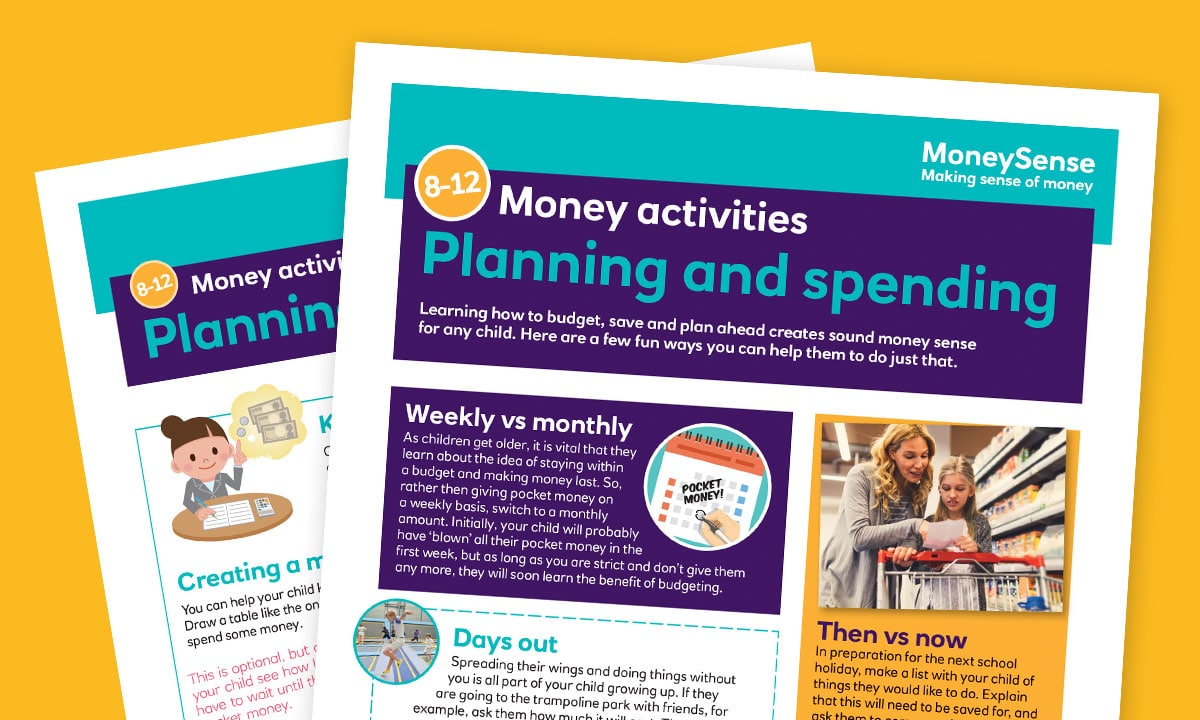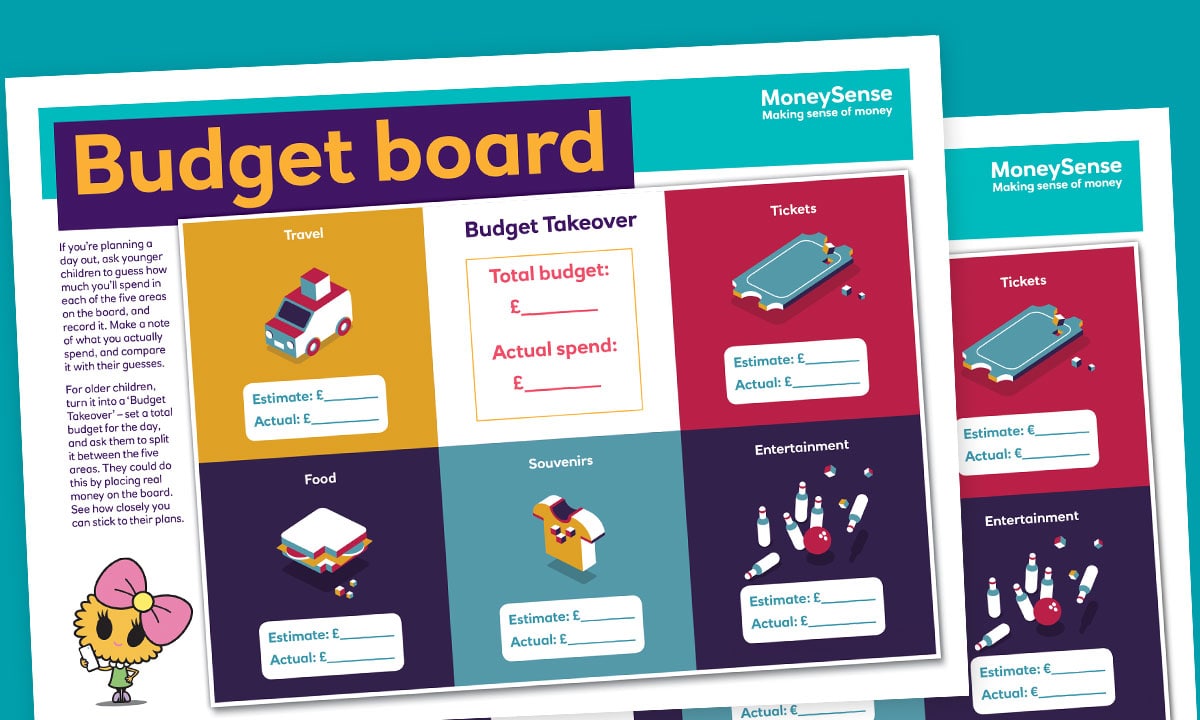Addressing your children’s money worries
With mental health awareness growing, research has shown that money can be a source of worry for children as well as parents – so how can we help tackle this? Leah Milner, an award-winning personal finance journalist who also lives with bipolar disorder, investigates.

Parents often worry about providing the best for their children and protecting them from the realities of adult life, which can occasionally include money concerns. Unfortunately, research also suggests that sometimes, despite their best efforts, children are picking up on their parents’ anxieties. A study by Action for Children1 found that 30% of children worry about their family having enough money to live comfortably (a figure that rises to 47% of those from low-income backgrounds).
Breaking the taboo
Leading child psychologist Dr Elizabeth Kilbey does not believe that children are naturally prone to money worries, but they can absorb their parents’ concerns around the subject – particularly when it is treated as a taboo. “There is this myth that we are going to damage children by giving them financial skills,” she says. “Parents can make children anxious about money through their behaviour, and some don’t want to talk to their children about money because they worry they won’t be able to answer their questions or that they will be burdening them with adult concerns. That is why parents stay away from the topic.” However, imparting the skills associated with money is something Dr Kilbey believes is essential in order to raise financially capable young people.
Jane Caro, Programme Lead for Families, Children and Young People at the Mental Health Foundation, agrees that children are very perceptive and are likely to have picked up on family worries about money, even if their parents or guardians are not talking about them. "If you have got money worries, it's better not to try to hide them from your children," she says. "Instead, have an open conversation with them, that's appropriate to their age. You could say: 'We are a bit worried about money at the moment, but we are dealing it so you don't need to worry about it. If you have questions, then it's fine to come and talk to me about them.'”
Practical skills
According to Dr Kilbey, the best way to introduce children to the concept of money is to start with a pragmatic approach. Focus on practical matters such as explaining what coins and notes are, how to use a cashpoint and the difference between a credit and debit card. “I want children to understand these things before they are old enough to sign on the dotted line for a payday loan, because that is not going to end well,” says Dr Kilbey. “Children need to be financially savvy and understand the information that they are given so that they can make choices by weighing things up.” She advocates getting children familiar with handling cash, paying for items in shops and the social interactions that entail from a young age.

Perceptions of money and success
Some of the most challenging discussions about money concern how we perceive our own financial position in relation to others. Closely linked to this is the extent to which we see money as a marker of success: MoneySense research2 showed that 73% of parents believe that their children’s ambitions for when they grow up are influenced to some extent by money and earning power. That means that for children to have a healthy understanding of money and earning it’s imperative that realistic conversations on those subjects are taking place from an early age.
“When you ask children ‘how much does the Prime Minister earn?’ or ‘how much does a footballer earn?’ you get some quite surprising results,” says Dr Kilbey. “These things are not obvious or linear in a way that we might hope they would be as adults. Here, we can begin to introduce children to some of the realities of how the adult world operates.”
Gratitude and acceptance
Children might also notice differences between what their parents can afford compared to their peers’ parents, for example if their friends are always getting new toys. It is important to acknowledge and not try to diminish their emotional reaction, says Dr Kilbey.
However, you can then try to provide them with a wider context and a framework for comparison. Together, look up how your child’s lifestyle, education and resources differ to that of a child in a developing country and use this to discuss what they are thankful for. “There is a lot of work around gratitude and acceptance and the positive impact that it has on mental health,” says Dr Kilbey. “This is how children learn that there is always somebody in a better situation and a worse position.”
Containing their fears
When it comes to dealing with children’s concerns around money, Dr Kilbey believes most parents already have this skillset but lack the confidence to broach the subject. Children need an adult to acknowledge their worries and confirm that the matter is in hand, but it is important to explain that it is not something they need to focus their energy on. “All children's worries need to be contained,” Dr Kilbey says. “Parents are very skilled at this as they have been dealing with monsters under the bed, natural disasters and all the other things that children can worry about. There is nothing special about containing financial anxiety.”
Meanwhile, by developing children’s financial literacy we can help reduce the risk of hardship when they grow up. “Equipping children with the skills that prevent them falling into poverty or debt will create a buffer to protect their future mental health,” says Dr Kilbey.
“Equipping children with the skills that prevent them falling into poverty or debt will create a buffer to protect their future mental health”
My own experience: a case study
Leah Milner, the journalist who authored this article, has her own unique insight into the topic of money and mental health.
“Living with bipolar, I’m all too aware of how money and mental health problems can be linked. I was an award-winning financial journalist working for The Times when I went through a period of severe illness, and the cost of being unable to work for eight months was significant. On top of this, compulsive spending is a common symptom of the high-mood phase of bipolar, wreaking further havoc. Thankfully I have regained stability and put my finances back on track, but self-reflection and learning to spot the early warning signs are key.
“My experience has taught me that developing a healthy relationship with money is critical to our mental wellbeing and the earlier we can form positive associations the better. A growing body of research suggests that financial difficulties can lead to anxiety and depression, while mental illness can make it much harder to manage our money well. If you are highly stressed or suffering from a low mood, tackling everyday financial tasks can feel incredibly daunting. But putting off paying bills or dealing with other issues just makes matters worse. The Money and Mental Health Policy Institute found that 46% of people in problem debt also have a mental health problem3. People with a mental health problem are 3.5 times more likely to be in problem debt than those without mental health problems.
“Talking about money and mental health with children from a young age can help to break down the stigma associated with both subjects. By creating a culture of openness and equipping children with the right practical skills, we can give them the best possible chance of staying financially and mentally well in the future.”
Practical tips for parents
1. TALK ABOUT IT
By far the most effective way of managing your child’s money worries is to make sure that talking about finances is not a taboo in your household. That doesn’t mean burdening them with every outgoing but making sure that they have a good grasp on money skills, and not dodging honest questions they have about your family’s spending.
2. KNOW WHAT NOT TO SHARE
While talking is important, ensure that any adult conversations you need to have about money issues don’t take place in front of your children. Knowing you’re in debt or that an unexpected bill has just arrived will concern them unnecessarily. However, if you do need to cut back on spending, explain what’s going to happen and reassure them that they don’t need to worry. You could even involve them in finding fun alternatives: if you’re not going on holiday, ask them to help plan some fun and free days out to enjoy together instead.
3. BE A GOOD ROLE MODEL
Show your children that while money is something you have to consider every day, it doesn’t have to be worrying. Discuss where money comes from, how it is earned and remind them of all the things you can afford as well as explaining why, sometimes, there are things you can’t. Why not invite them to help you make a family budget so they understand how you manage your money?

 Articles:
Articles: 
 Interactive activity:
Interactive activity: 
 Activities:
Activities: 
 Poster:
Poster: 



